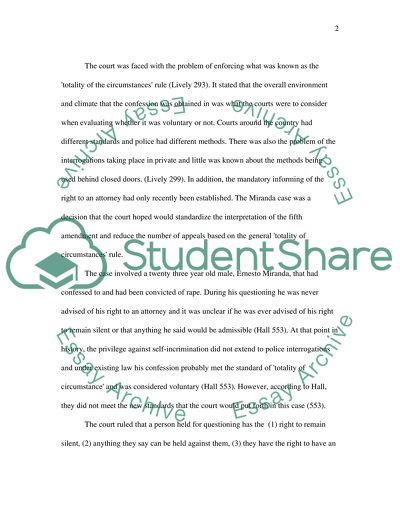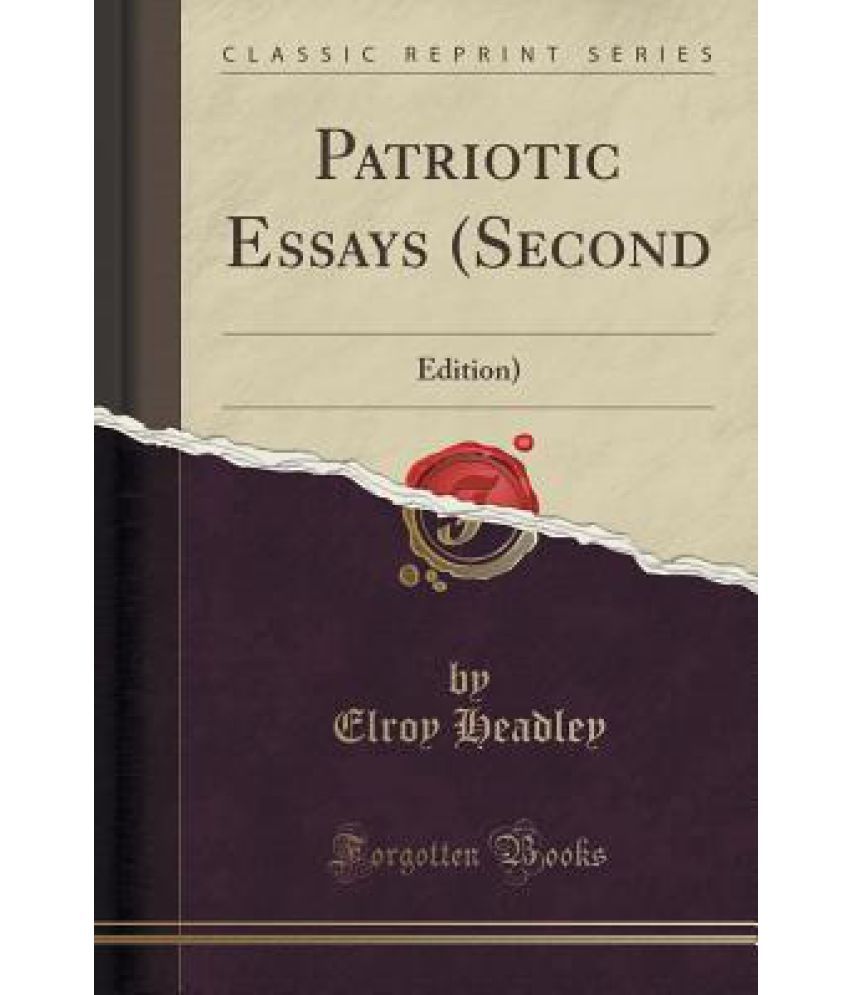
Argumentative Essay On Miranda Vs. Arizona Words | 2 Pages. Miranda v Arizona Everyone has heard the lines, “You have the right to remain silent. Anything you say can and will be used against you in a court of law ” It has been played on television and in movies so often that it would be rare for an individual not to have heat it Aug 13, · On appeal, the supreme court of Arizona shockingly ruled that no constitutional rights violation was done in Miranda’s case in the process of obtaining the confession and reaffirmed the conviction. In reaching its decision the court emphasized heavily of the fact that Miranda did not specifically request counsel. blogger.comted Reading Time: 12 mins May 01, · Miranda V. Arizona Topics: Miranda v. Arizona, Supreme Court of the United States, Sixth Amendment to the United States Constitution Pages: 6 ( words) Published: May 1,
Miranda V. Arizona Essay
While the free essays can give you inspiration for writing, they cannot be used 'as is' because they will not meet your assignment's requirements. Waste no more time! Liberation from old traditions brought about a new interest in the arts and literature. The church's doctrine was no longer the sole basis of scholarly work. New ideas and concepts started to em.
Howard So. Appleton Police Department essay Daniel Wolski Tuesday Appleton Police Department Appleton is in the heart of the Fox Cities in east central Wisconsin. The population is about 70,00 and is the 6 largest city in Wisconsin and the metropolitan area is more thenThe history of the police department is in t.
Free Essays Must Be Free! Miranda V Arizona Essay While the free essays can give you inspiration for writing, they cannot be used 'as is' because they will not meet your assignment's requirements, miranda vs arizona essay.
Inthe U. Supreme Court handed down its landmark decision in Miranda v. The Miranda decision was a departure from the established law in the area of police interrogation. Prior to Miranda, miranda vs arizona essay, a confession would be suppressed only if a court determined it resulted from some actual coercion, threat, or promise.
The Miranda decision was intended to protect suspects of their 5th Amendment right of no self-incrimination. The verdict of Miranda v. Arizona is an efficient way of informing criminal suspects of their rights established by the Constitution, allowing un-Constitutional confessions to be nullinvoid in the court of law.
However, it does not enforce it well enough. For example, a statement taken in violation of Miranda can be used for impeachment purposes and deciding whether evidence derived from a Miranda violation is admissible. Also, Miranda applies to undercover police interrogation and prior to routine booking questions, protecting all suspect in American custody to be aware of their rights, miranda vs arizona essay. Next, it says that police may not continue to interrogate a suspect after he makes a request for a lawyer.
At approximately p. on November 27,a young woman left the First National Bank of Arizona after attending night classes. Four months later, the same suspect abducted an year-old girl at knife-point and, after tying her hands and feet, drove to a secluded area of the desert and raped her, miranda vs arizona essay. On March miranda vs arizona essay,police arrested year-old Ernesto Arthur Miranda as a suspect in the two crimes.
Miranda had a prior arrest record for armed robbery and a juvenile record for, among other things, attempted rape, assault, and burglary. Both victims viewed corporeal lineups and identified Miranda as their attacker, miranda vs arizona essay.
The police questioned Miranda, and he confessed to both crimes. He signed a confession to the rape that included a typed paragraph explaining that the statement was made voluntarily without threats or promises of immunity and that he had full knowledge of his rights and understood that the statement could be used against him. Ultimately, the Supreme Court reversed Miranda's conviction and ordered that the confession in the rape case be suppressed.
The Court ruled that "an individual held for interrogation must be clearly informed that he has the right to consult with a lawyer and have the lawyer with him during inter-rogation that if he is indigent a lawyer will be appointed to represent him" US Suprime Court.
The Court reasoned that all custodial police interrogations are inherently coercive and could never result in a voluntary statement in the absence of a knowing, miranda vs arizona essay, intelligent, and voluntary waiver of the rights enumerated in the Miranda warnings, miranda vs arizona essay.
Under Miranda, the Supreme Court established an irrebuttable presumption that a statement is involuntary if it is taken during custodial interrogation without a waiver of the so-called Miranda warnings. A statement taken in violation of Miranda would result in the suppression of the statement, even though the statement was otherwise voluntary and not the result of coercion of any kind. In fact, in the Miranda decision, the Supreme Court acknowledged that Ernesto Miranda was not subjected to any coercion that would render his statement involuntary in traditional terms.
The Miranda requirements apply only when a suspect is both in custody and subjected to interrogation. For purposes of Miranda, "custody" is defined as an arrest or significant deprivation of freedom equivalent to an arrest, miranda vs arizona essay.
If the suspect asserts the right to silence, an officer must honor the suspect's assertion and stop the interrogation. However, the officer may reinitiate contact and obtain a valid waiver after a reasonable period of time. On the other hand, if a suspect asserts the right to an attorney, questioning must cease and may only be recommenced if the defendant reinitiates communication with the officer. Subsequent US Supreme Court decisions have limited the Miranda exclusionary rule. Five years after Miranda, the Supreme Court decided Harris v.
New York. With only two of miranda vs arizona essay five justices in the original Miranda majority still on the Court, the Supreme Court held that a statement taken in violation of Miranda could be used to impeach the credibility of a defendant at trial. The police in Harris failed to miranda vs arizona essay the defendant of his right to counsel prior to custodial inter-rogation, which was a violation of Miranda.
The prosecution did not use the miranda vs arizona essay during the case in chief. However, when the defendant took the stand, he contradicted his postarrest statement. The Supreme Court approved of the prosecution using the post-arrest statement to impeach the defendant during cross-examination, because the Court was not going to allow the defendant to use the Miranda decision as a license to commit perjury.
Interestingly, the Court observed that the defendant made "no claim that the statements made to the police were coerced or involuntary" US Suprime Court. Miranda vs arizona essay statement by the Supreme Court was a signal that the Court was prepared to abandon the position miranda vs arizona essay statements made by a suspect during custodial interrogation are presumptively involuntary.
That presumption was the reason given for requiring Miranda warnings in the first place. In another case, Oregon v. Haas, the Supreme Court followed the precedent in Harris and ruled that a defendant's statement may be used to impeach the defendant, even if that statement was taken after the defendant requested an attorney during The rest of the paper is available free of charge to our registered users. The registration process just couldn't be easier, miranda vs arizona essay.
Log in or register now. It is all free! All Rights Reserved.
Miranda v. Arizona - BRI's Homework Help Series
, time: 3:20Facts and Case Summary - Miranda v. Arizona | United States Courts

Aug 06, · The background of Miranda v. Arizona dates back to when police officers in Phoenix, Arizona arrested a Mexican immigrant, Ernesto Miranda, for rape and kidnapping crimes. The police officers put Miranda into custody and interrogated him for approximately tow hours. However, the police officers questioning Miranda erred in one thin Aug 13, · On appeal, the supreme court of Arizona shockingly ruled that no constitutional rights violation was done in Miranda’s case in the process of obtaining the confession and reaffirmed the conviction. In reaching its decision the court emphasized heavily of the fact that Miranda did not specifically request counsel. blogger.comted Reading Time: 12 mins In , the U. S. Supreme Court handed down its landmark decision in Miranda v. Arizona. The Miranda decision was a departure from the established law in the area of police interrogation. Prior to Miranda, a confession would be suppressed only if a court determined it resulted from some actual coercion, threat, or promise. The Miranda decision was intended to protect suspects of their 5th

No comments:
Post a Comment